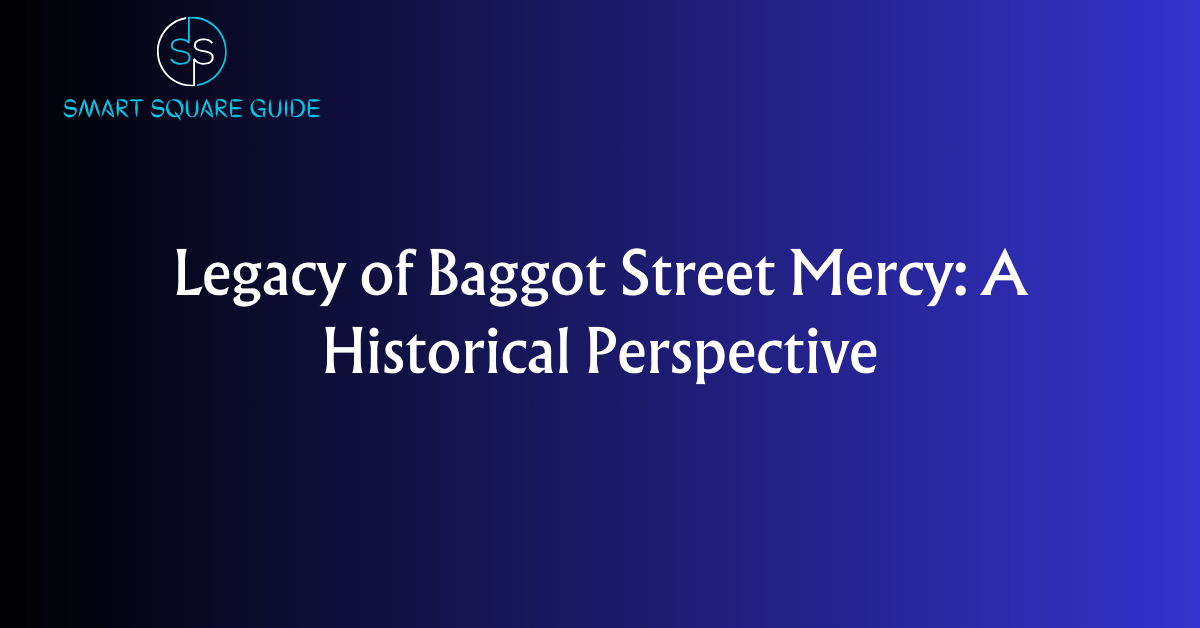Legacy of Baggot Street Mercy: A Historical Perspective
In the heart of Dublin, Ireland, lies a place of historical significance that has touched the lives of countless individuals for nearly two centuries. Though rooted in history, Baggot Street Mercy continues to embody its compassion, care, and community engagement mission. This article explores the remarkable journey of Baggot Street Mercy, from its humble beginnings to its global impact, all while upholding the legacy of its founder, Catherine McAuley.+

Origins of Baggot Street Mercy
Baggot Street Mercy traces its origins to the early 19th century when Catherine McAuley, a pioneering Irishwoman, founded the Sisters of Mercy. Catherine’s vision was to provide education, healthcare, and social services to the less fortunate, particularly women and children. Baggot Street in Dublin became the home and heart of this noble endeavor, setting the stage for a legacy that would transcend generations.
The Mission of Mercy
Central to Baggot Street Mercy’s mission are the values of compassion, justice, and service to the marginalized. The Sisters of Mercy took a vow of service, dedicating their lives to the community’s welfare, which remains a cornerstone of their identity.
The Expansion of Mercy
Over the years, Baggot Street Mercy expanded its reach across Ireland and beyond. Convents and institutions were established worldwide, each embodying the core principles of the Sisters of Mercy. The organization’s footprint extended across continents, making it a global force for good.
Mercy Beyond Ireland
Baggot Street Mercy’s influence is not confined to Ireland. Its commitment to education and healthcare established various countries’ schools, hospitals, and social service programs. The Sisters of Mercy answered the call to serve wherever needed, leaving an indelible mark on countless communities worldwide.
Challenges and Triumphs
The journey was not without its challenges. Baggot Street Mercy faced adversity, including economic hardships and societal changes. However, they navigated these obstacles through unwavering dedication and innovation and continued their mission.
Educational Initiatives
One of Baggot Street Mercy’s most significant contributions has been education. The organization established schools with educated generations of students, empowering them with knowledge and values extending far beyond the classroom.
Healthcare and Social Services
In addition to education, Baggot Street Mercy has played a crucial role in healthcare and social services. Hospitals and outreach programs have provided medical care and support to countless individuals, embodying the spirit of mercy and compassion.
Legacy of Compassion
The legacy of Baggot Street Mercy lives on through the countless lives it has touched. Its commitment to compassion, justice, and service continues to inspire individuals and organizations worldwide to make a positive impact on society.
Preserving the Heritage
Efforts are underway to preserve the historical heritage of Baggot Street Mercy. Museums, archives, and historical sites ensure the organization’s rich history and contributions are not forgotten.
Honouring Catherine McAuley
Catherine McAuley’s vision and dedication are celebrated within Baggot Street Mercy. Her life story is a source of inspiration for all who walk in her footsteps.
A Beacon of Hope
In times of adversity and uncertainty, Baggot Street Mercy remains a beacon of hope, providing support and solace to those in need. Its unwavering commitment to justice and compassion shines brightly.
Community Engagement
Baggot Street Mercy actively engages with local communities, fostering partnerships and initiatives that address contemporary challenges. Their presence continues to be a source of strength for those they serve.
Sustainability and Innovation
While rooted in tradition, Baggot Street Mercy embraces sustainability and innovation. The organization adapts to society’s evolving needs, ensuring its mission remains relevant and impactful.
FAQ’s
What is Baggot Street Mercy, and why is it historically significant?
Baggot Street Mercy refers to the Baggot Street Convent, the founding location of the Sisters of Mercy, a religious congregation within the Catholic Church. It is historically significant for several reasons:
Founding of the Sisters of Mercy: Baggot Street Convent in Dublin, Ireland, is where Catherine McAuley, an Irishwoman, founded the Sisters of Mercy in 1831. Catherine was motivated by compassion and a desire to serve the poor and marginalized in society, especially women and children.
Mercy Charism: Baggot Street Mercy played a pivotal role in shaping the Mercy charism, which emphasizes acts of mercy, compassion, and service. The Sisters of Mercy dedicated themselves to education, healthcare, and social services, particularly for those in need.
Global Expansion: The Baggot Street Mercy community served as a model for other convents and communities of the Sisters of Mercy worldwide. They established similar missions and schools, helping to spread the Mercy charism far beyond Ireland.
Legacy of Catherine McAuley: Catherine McAuley’s teachings and vision for the Sisters of Mercy inspire countless individuals and organizations globally. Her legacy has left an indelible mark on the history of religious congregations and charitable work.
How did Baggot Street Mercy expand globally, and where can we find its influence today?
Baggot Street Mercy expanded globally through the following fundamental mechanisms:
Missionary Work: Sisters from the Baggot Street Convent embarked on missionary journeys to various countries, including the United States, Australia, New Zealand, and South America. They established new communities and missions, often focusing on education and healthcare.
Local Leadership: As the Sisters of Mercy expanded to different regions, local women often joined the congregation and assumed leadership roles. This allowed for adaptation to local cultures and needs while maintaining the core values of the Mercy charism.
Educational Institutions: One of the primary ways Baggot Street Mercy expanded its influence was by establishing schools and educational institutions. These schools provided education to countless students and played a crucial role in shaping the communities they served.
Social Services: Baggot Street Mercy also established various social service organizations and healthcare facilities, addressing the needs of vulnerable populations worldwide.
Today, the influence of Baggot Street Mercy is still evident in numerous ways:
Educational Institutions: Mercy-founded schools and universities continue to operate in many countries, providing quality education and instilling values of compassion and service.
Charitable Organizations: The Sisters of Mercy and Mercy-associated organizations continue to be involved in various charitable and social service activities, addressing issues such as poverty, healthcare, and social justice.
Global Network: The global network of the Sisters of Mercy remains active, promoting the values and teachings of Catherine McAuley in various parts of the world.
Inspiration: Catherine McAuley’s legacy and the Mercy charism inspire individuals and groups committed to serving others with compassion, mercy, and dignity.
In conclusion, Baggot Street Mercy, the birthplace of the Sisters of Mercy, holds historical significance as the origin of a worldwide movement dedicated to compassionate service, education, and social justice. Its influence is still felt today through the global presence of the Sisters of Mercy and the ongoing work of Mercy-inspired institutions and individuals.
